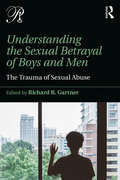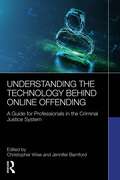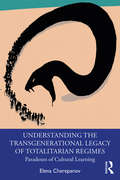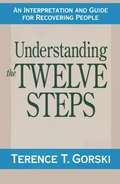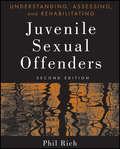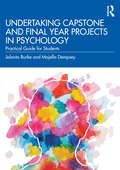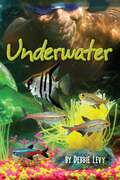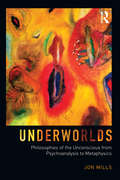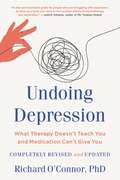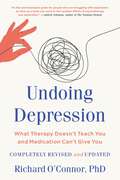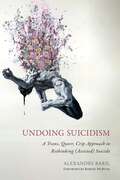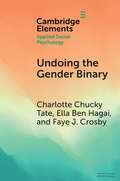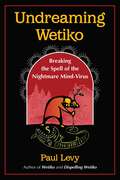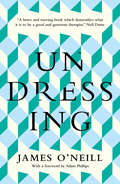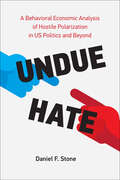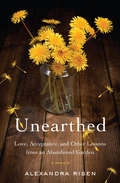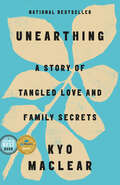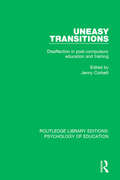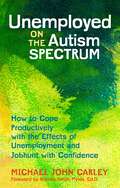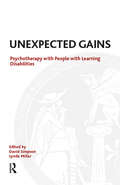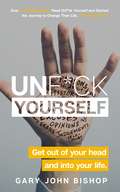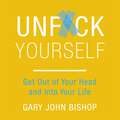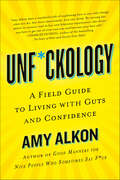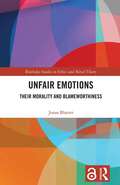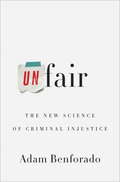- Table View
- List View
Understanding the Sexual Betrayal of Boys and Men: The Trauma of Sexual Abuse (Psychoanalysis in a New Key Book Series)
by Richard B. GartnerUnderstanding the Sexual Betrayal of Boys and Men: The Trauma of Sexual Abuse is an indispensable go-to book for understanding male sexual victimization. It has become increasingly clear since the 1980s that men and boys, like women and girls, are sexually abused and assaulted in alarming numbers. Yet there have been few resources available to victims, their loved ones, or those trying to help them. Richard B. Gartner was in the vanguard of clinicians treating male sexual victimization and has written extensively about it, initially in professional papers, then in his landmark 1999 book for clinicians Betrayed as Boys: Psychodynamic Treatment of Sexually Abused Men, continuing with his 2005 work Beyond Betrayal: Taking Charge of Your Life after Boyhood Sexual Abuse. He has been a tireless teacher, clinician, and advocate for male victims of sexual abuse in the classroom, the lecture hall, and of course the consulting room as well as in newspaper, television, radio, and online interviews. Dr. Gartner has gathered together expert colleagues from the trauma, psychoanalytic, medical, and survivor treatment fields. Together, they have created a comprehensive guide to what was once thought to be a rarity but now is clearly an all-too-common occurrence. Understanding the Sexual Betrayal of Boys and Men looks at the realities of male sexual victimization, guiding clinicians and lay people alike to understand the complexities of the devastation it causes in victimized boys and men. It considers topics as diverse as: sexual assault in institutions like the military, sports teams, schools, universities, and religious organizations; sex trafficking of boys and adolescents; neurobiology and brain chemistry of male survivors of sexual abuse; gender and sexual dysfunctions and confusions resulting from sexual exploitation and trauma; physicians’ treatment of sexually abused men’s medical problems; socio-cultural influences on processing and treating men’s and boys’ sexual victimization. Understanding the Sexual Betrayal of Boys and Men is required reading for anyone working with male victims of sexual abuse and assault at any level – psychotherapists, rape counselors, attorneys, journalists, guidance counselors, physicians, clergy, graduate students, and lawmakers – and helpful to lay people interested in this often-unrecognized problem.
Understanding the Technology Behind Online Offending: A Guide for Professionals in the Criminal Justice System
by Christopher Wise Jennifer BamfordUnderstanding the Technology Behind Online Offending: A Guide for Professionals in the Criminal Justice System is a non-technical explanation of online offences by a cybersecurity expert, bridging the gap between the high-tech world of cybercrime and the non-technical professionals working within it.The book begins by equipping the reader with a foundational understanding of how the internet works before exploring the various ways that people can exploit the Internet to commit crimes. The reader is then introduced to some of the sophisticated ways that individuals may evade detection before we explore the organisations fighting to prevent and capture those offending online. The book includes a contributory chapter from solicitors at Stone King LLP to help the reader understand how the law is evolving to prosecute offenders. There is a further contributory chapter from psychologist Dr Ruth J Tully who discusses psychological risk assessment with those who offend online. The book concludes with important chapters looking at how professionals can keep themselves safe online, and future directions of the internet.The book's intended audience includes all professionals who work with those who commit online offences, such as psychologists, solicitors, social workers, probation officers and police officers. The book is also suitable for those in training or graduate education.
Understanding the Transgenerational Legacy of Totalitarian Regimes: Paradoxes of Cultural Learning
by Elena CherepanovUnderstanding the Transgenerational Legacy of Totalitarian Regimes examines the ways in which the cultural memory of surviving totalitarianism can continue to shape individual and collective vulnerabilities as well as build strength and resilience in subsequent generations. The author uses her personal experience of growing up in the former Soviet Union and professional expertise in global trauma to explore how the psychological legacy of totalitarian regimes influences later generations’ beliefs, behaviors, and social and political choices. The book offers interdisciplinary perspectives on the complex aftermath of societal victimization in different cultures and discusses survivors’ experiences. Readers will find practical tools that can be used in family therapy, cognitive-behavioral therapy, and peace building to recognize and challenge preconceived assumptions stemming from cultural trauma. This book equips trauma-minded mental health professionals with an understanding of the transgenerational toxicity of totalitarianism and with strategies for becoming educated consumers of cultural legacy.
Understanding the Twelve Steps: An Interpretation and Guide for Recovering People
by Terence T. GorskiMillions of people have transformed their lives by working the Twelve Steps of Alcoholics Anonymous. Their success has come from their ability to truly understand these principles and to apply them in their daily lives. Yet for many embarking on the road to recovery, the Steps can seem vague, even confusing. This practical, no-nonsense guide takes the mystery out of the Twelve Steps, presenting a straightforward explanation of what each step means, as well as examples of how it translates to real life. Written by a certified alcoholism and drug abuse counselor with more than twenty years of experience, it offers a wealth of wisdom, knowledge, and genuine support for anyone in recovery. Understanding the Twelve Steps features: Clear, easy-to-understand interpretation of the Twelve Steps -- the vital building blocks of recovery Checklists that summarize the tasks and objectives of each step The Twelve Promises -- the positive changes you can expect in your life if you follow the Twelve Steps What happens at Twelve Step meetings and why it is important to have a sponsor The experiences, strength, and hope of other recovering people
Understanding, Assessing, and Rehabilitating Juvenile Sexual Offenders
by Phil RichPraise for Understanding, Assessing, and Rehabilitating Juvenile Sexual Offenders, Second Edition "The Second Edition of Understanding, Assessing, and Rehabilitating Juvenile Sexual Offenders showcases Phil Rich's experience and mastery of the research and clinical literature. In my view, this is an excellent therapy book and, like its predecessor, will help practitioners to work effectively and ethically with juvenile offenders. It is destined to become a classic. " -Tony Ward, PhD, DipClinPsy; Victoria University of Wellington, Wellington, New Zealand "Phil Rich is considered one of the world's leading authorities on how best to understand, assess, and treat juvenile sexual offenders, and this Second Edition of his excellent text shows why he is held in such high regard. All theoreticians, researchers, and practitioners whose work brings them in contact with juvenile sexual offenders should definitely read this remarkable book. " -W. L. Marshall, OC, FRSC, PhD; Director, Rockwood Psychological Services, Ontario, Canada "Phil Rich's book, Understanding, Assessing, and Rehabilitating Juvenile Sexual Offenders, Second Edition offers new and thought-provoking ideas, updates, and information, especially on developmental pathways. This book is one of the few publications on juvenile sexual offending that offers something new and revealing to the field. " -Robert E. Longo, LPC, NCC, ACS, BCIA-EEG, BCN; Serendipity Healing Arts, Lexington, North Carolina "Phil Rich masterfully fills the gap in the juvenile sexual offender treatment literature with a book that is neither introductory nor narrowly specialized. Seasoned veterans will appreciate his thoughtful and studied approach. Newcomers will find this book a vital go-to resource. " -David Prescott, LICSW, Clinical Director, Becket Family of Services, Falmouth, Maine "Mind-blowingly brilliant-Rich by name and rich in depth, detail, description, and debate. An instant classic, Understanding, Assessing, and Rehabilitating Juvenile Sexual Offenders, Second Edition is both comprehensive and challenging with its material and messages, yet reassuringly accessible and practical. " -Martin C. Calder, Calder Social Work Training and Consultancy, Leigh, Lancashire, UK THE LANDMARK TEXT FOR WORKING WITH JUVENILE SEXUAL OFFENDERS AND UNDERSTANDING SEXUALLY ABUSIVE BEHAVIOR IN CHILDREN AND ADOLESCENTS-NOW FULLY REVISED Thoroughly revised, the Second Edition of Understanding, Assessing, and Rehabilitating Juvenile Sexual Offenders guides mental health professionals through the breadth of assessment and intervention methods available for working with this special population, providing a succinct yet complete survey of the field, the etiological development of sexually abusive behavior in juveniles, and a reliable resource for assessment, treatment, and rehabilitation.
Undertaking Capstone and Final Year Projects in Psychology: Practical Guide for Students
by Jolanta Burke Majella DempseyUndertaking Capstone and Final Year Projects in Psychology serves a seminal purpose in guiding its readers to create a capstone project. The text employs traditional and emerging methodologies and methods in order to posit an exhaustive approach that the psychology students can adopt to see their project to fruition. The text aims at fortifying the reader’s skills through the structure of its chapters as they begin to work on their capstone or final year project. The chapters collectively explore the varied aspects that are involved in the completion of a final year project, that is, beginning from the inception of the idea to laying the foundation, designing the project, analysing the data, and, finally, presenting the findings. The text guides the reader through each step and provides further guidance on approaching the idea, coming up with the research question, positioning it within the epistemological and ontological context, and constructing the theoretical framework to arrive at the optimal design solutions. The text will be useful for psychology students who are currently completing a capstone or a final year project. It is further aimed at psychology students who will subsequently be working on a project and are looking forward to gaining cognisance regarding the approach and the methodology to be adopted for the same.
Underwater (Exceptional Reading And Language Arts Titles For Intermediate Grades Ser.)
by Debbie LevyTwelve-year-old Gabe has ambitions to be the next Jacques Cousteau...or Bill Gates...or who? Gabe's anxiety about growing up is matched by his fear that he'll be crazy (like his brother). But he finds some relief in his underwater computer game, setting up his own aquarium, and swimming on the local team. Could it be that some things will just take care of themselves?
Underworlds: Philosophies Of The Unconscious From Psychoanalysis To Metaphysics
by Jon MillsThe first book of its kind to provide a detailed analysis of the history of the unconscious from the underworlds of Greek and Egyptian mythology to psychoanalysis and metaphysics, Jon Mills presents here a unique study of differing philosophies of the unconscious. Mills examines how three major philosophical systems on the nature of the unconscious emerge after modern philosophy, finding their most celebrated elaborations in Freud, Lacan and Jung. These three psychoanalytic traditions, quite separate from one another in terms of their emphasis and philosophical presuppositions, are scrutinised alongside contemporaneous movements in existential phenomenology, semiotics, epistemology, transcendental psychology and Western metaphysics in the texts of Hegel, Heidegger, Sartre and Whitehead. Underworlds provides a scholarly exegesis and critique of the main philosophies of the unconscious to have transpired in the history of ideas. Exploring the unconscious from its philosophical beginnings in antiquity to its systematic articulation brought about by the rise of psychoanalysis, Underworlds is ideal for practicing psychoanalysts, academics of Freud, Jung and Lacan, and scholars of psychology, philosophy and the humanities.
Undoing Depression: What Therapy Doesn't Teach You and Medication Can't Give You
by Richard O'ConnorLike heart disease, says psychotherapist Richard O'Connor, depression is fueled by complex and interrelated factors: genetic, biochemical, environmental. In this refreshingly sensible book, O'Connor focuses on an additional factor often overlooked: our own habits. Unwittingly we get good at depression. We learn how to hide it, how to work around it. We may even achieve great things, but with constant struggle rather than satisfaction. Relying on these methods to make it through each day, we deprive ourselves of true recovery, of deep joy and healthy emotion. UNDOING DEPRESSION teaches us how to replace depressive patterns with a new and more effective set of skills. We already know how to "do" depression--and we can learn how to undo it. With a truly holistic approach that synthesizes the best of the many schools of thought about this painful disease, O'Connor offers new hope--and new life--for sufferers of depression.
Undoing Depression: What Therapy Doesn't Teach You and Medication Can't Give You
by Richard O'ConnorThe bestselling approachable guide that has inspired thousands of readers to manage or overcome depression — fully revised and updated for life in the 21st century.Depression rates around the world have skyrocketed in the 20‑plus years since Richard O'Connor first published his classic book on living with and overcoming depression. Nearly 40 million American adults suffer from the condition, which affects nearly every aspect of life, from relationships, to job performance, physical health, productivity, and, of course, overall happiness. And in an increasingly stressful and overwhelming world, it's more important than ever to understand the causes and effects of depression, and what we can do to overcome it. In this fully revised and updated edition — which includes updated information on the power of mindfulness, the relationship between depression and other diseases, the risks and side effects of medication, depression&’s effect on thinking, and the benefits of exercise — Dr. O'Connor explains that, like heart disease and other physical conditions, depression is fueled by complex and interrelated factors: genetic, biochemical, environmental. But Dr. O'Connor focuses on an additional factor that is often overlooked: our own habits. Unwittingly we get good at depression. We learn how to hide it, and how to work around it. We may even achieve great things, but with constant struggle rather than satisfaction. Relying on these methods to make it through each day, we deprive ourselves of true recovery, of deep joy and healthy emotion. Undoing Depression teaches us how to replace depressive patterns with a new and more effective set of skills. We already know how to "do" depression—and we can learn how to undo it. With a truly holistic approach that synthesizes the best of the many schools of thought about this painful disease, and a critical eye toward medications, O'Connor offers new hope—and new life—for sufferers of depression.
Undoing Suicidism: A Trans, Queer, Crip Approach to Rethinking (Assisted) Suicide
by Alexandre BarilIn Undoing Suicidism, Alexandre Baril argues that suicidal people are oppressed by what he calls structural suicidism, a hidden oppression that, until now, has been unnamed and under-theorized. Each year, suicidism and its preventionist script and strategies reproduce violence and cause additional harm and death among suicidal people through forms of criminalization, incarceration, discrimination, stigmatization, and pathologization. This is particularly true for marginalized groups experiencing multiple oppressions, including queer, trans, disabled, or Mad people. Undoing Suicidism questions the belief that the best way to help suicidal people is through the logic of prevention. Alexandre Baril presents the thought-provoking argument that supporting assisted suicide for suicidal people could better prevent unnecessary deaths. Offering a new queercrip model of (assisted) suicide, he invites us to imagine what could happen if we started thinking about (assisted) suicide from an anti-suicidist and intersectional framework. Baril provides a radical reconceptualization of (assisted) suicide and invaluable reflections for academics, activists, practitioners, and policymakers.
Undoing the Gender Binary (Elements in Applied Social Psychology)
by Charlotte Chucky Tate Ella Ben Hagai Faye J. CrosbyThe central question of this Element is this: What does it mean to be transgender - in general and in specific ways? What does the designation mean for any individual and for the groups in which the individual exists? Biologically, what occurs? Psychologically, what transpires? The Element starts with the basics. The authors question some traditional assumptions, lay out some bio-medical information, and define their terms. They then move to the question of central concern, seen first in terms of the individual and then in terms of the group or society. They conclude with some implications, urging some new approaches to research and suggest some applications in the classroom and beyond.
Undreaming Wetiko: Breaking the Spell of the Nightmare Mind-Virus
by Paul LevyTransform wetiko into its own antidote• Learn how ancestral trauma is at the root of wetiko and how the wounded healer/shaman archetype can help bring both individual and collective healing• Meet the inner guide--a daemon/angel that lives within us as an ally in our encounters with the daemonic energy of wetiko• Cultivate &“symbolic awareness&” as a path to creating meaning and transmute the poison of wetiko into medicine for healingThe profound and radical Native American idea of &“wetiko,&” a virus of the mind, underlies the collective insanity and evil that is destructively playing out around the world. Yet, as Paul Levy reveals in depth, encoded within wetiko itself lies the very medicine needed to combat the mindvirus and heal both ourselves and our world. Levy begins by investigating how the process of becoming triggered, wounded, or falling into suffering can help us better understand the workings of wetiko in a way that transforms our struggles into opportunities for awakening. He reveals the source of wetiko: unhealed multigenerational ancestral trauma, which is acted out and propagated through the family. He highlights one of the primary archetypes currently activated in the collective unconscious of humanity—the wounded healer/shaman—and shows how recognizing this archetype can help us as we navigate a collective descent into the underworld of the unconscious, a true bardo realm between our past and future worlds. Drawing on the work of C. G. Jung, Rudolf Steiner, Henry Corbin, Wilhelm Reich, and Nicolas Berdyaev, the author introduces the inner guide—a daemon/angel that lives within us as an ally in our encounters with the daemonic energy of wetiko. He explores how to cultivate &“symbolic awareness&” (interpreting events in our lives symbolically—like a dream) as a path to creating meaning, which alchemically transmutes the poison of wetiko into medicine for healing the psyche. Ultimately, the author reveals that the best protection and medicine for wetiko is to connect with the light of our true nature by becoming who we truly are.
Undressing
by James O'Neill"In O?Neill's book - at once a case-history, a novella, and something more than either - we have a remarkable story of what two people can do for each other if they can experiment with trust.? Adam PhillipsWhen therapist-in-training James O?Neill starts his placement at a therapy centre in west London, his first referral is Abraham, a silent and frightened young man in a tightly-zipped, hooded anorak.For the majority of their initial sessions, Abraham hardly speaks. But O?Neill gradually gains his trust and learns of the abuse and violence Abraham was subjected to as a child that caused him to hide away from the world - barely sleeping, too afraid to get undressed even in the shower.Over the many years they meet, Abraham?s unfolding story and bravery inspire O?Neill to confront his own complicated past. Together they achieve something radical, as Abraham creates his own kind of therapy and teaches O?Neill to do the same.
Undue Hate: A Behavioral Economic Analysis of Hostile Polarization in US Politics and Beyond
by Daniel F. StoneHow to understand the mistakes we make about those on the other side of the political spectrum—and how they drive the affective polarization that is tearing us apart.It&’s well known that the political divide in the United States—particularly between Democrats and Republicans—has grown to alarming levels in recent decades. Affective polarization—emotional polarization, or the hostility between the parties—has reached an unprecedented fever pitch. In Undue Hate, Daniel F. Stone tackles the biases undergirding affective polarization head-on. Stone explains why we often develop objectively false, and overly negative, beliefs about the other side—causing us to dislike them more than we should.Approaching affective polarization through the lens of behavioral economics, Undue Hate is unique in its use of simple mathematical concepts and models to illustrate how we misjudge those we disagree with, for both political and nonpolitical issues. Stone argues that while our biases may vary, just about all of us unwisely exacerbate conflict at times—managing to make ourselves worse off in the long run. Finally, the book offers both short- and long-term solutions for tempering our bias and limiting its negative consequences—and, just maybe, finding a way back to understanding one another before it is too late.
Unearthed: Love, Acceptance, and Other Lessons from an Abandoned Garden
by Alexandra Risen&“A generous, poignant memoir&” of loss, family secrets, and a quest to shape something beautiful out of the chaos of nature (Kirkus Reviews). Just as Alex and her husband buy a house in Toronto, set atop an acre of wilderness that extends into a natural gorge in the middle of the city, she learns that her father, a Ukrainian-born immigrant, has died. Her new home&’s gigantic, abandoned garden, choked with weeds and crumbling antique structures, resembles a wild jungle—and it stirs cherished memories of Alex&’s childhood: When her home life became unbearable, she would escape to the forest. In her new home, Alex can feel the power of the majestic trees that nurtured her in her youth, but as she begins to beat back the bushes to unveil the garden&’s mysteries, her mother has a stroke and develops dementia. When Alex discovers an envelope of yellowed documents while sorting through her father&’s junk pile, offering clues to her parents&’ mysterious past, she reluctantly musters the courage to uncover their secrets. While discovering the plants hidden in the garden—from primroses and maple syrup–producing sugar maples to her mother&’s favorite, lily of the valley—she must come to terms with the circle of life around her, and find the courage to tend to her own family&’s future. &“The land is rife with unexpected delights: a huge, decaying pagoda, underground aquifers, a pond, koi, deer, and all manner of vegetation. . . . As she restores the property and heals her long-troubled soul, Risen paints a vivid and exquisite portrait of nature and its profound significance.&” —Publishers Weekly
Unearthing: A Story of Tangled Love and Family Secrets
by Kyo MaclearWINNER OF THE 2023 GOVERNOR GENERAL'S LITERARY AWARD FOR NONFICTIONFor readers of Crying in H Mart and Wintering, an unforgettable memoir about a family secret revealed by a DNA test, the lessons learned in its aftermath, and the indelible power of love.Three months after Kyo Maclear&’s father dies in December 2018, she gets the results of a DNA test showing that she and the father who raised her are not biologically related. Suddenly Maclear becomes a detective in her own life, unravelling a family mystery piece by piece, and assembling the story of her biological father. Along the way, larger questions arise: what exactly is kinship? And what does it mean to be a family? Thoughtful in its reflections on race and lineage, unflinching in its insights on grief and loyalty, Unearthing is a captivating and propulsive story of inheritance that goes beyond heredity. What gets planted, and what gets buried? What role does storytelling play in unearthing the past and making sense of a life? Can the humble act of tending a garden provide common ground for an inquisitive daughter and her complicated mother? As it seeks to answer these questions, Unearthing bursts with the very love it seeks to understand.
Uneasy Transitions: Disaffection in Post-Compulsory Education and Training (Routledge Library Editions: Psychology of Education)
by Jenny CorbettOriginally published in 1990, this title offers a range of perspectives from practitioners, administrators and researchers, examining personal experiences of disaffection in students and staff within the context of national political, social, and economic change. The transitions include moves into employment, training of continued education. Expressions of unease and disquiet are set clearly within the political context of marginalized status for minority groups, highlighting issues relating to disability, gender, class and race, in which the process of transition has been impeded through discriminating practices. The book includes reflections from practitioners, offering coping strategies and flexible approaches, and responses from administrators indicating their awareness of the need to support practitioners during the process of change.
Unemployed on the Autism Spectrum: How to Cope Productively with the Effects of Unemployment and Jobhunt with Confidence
by Brenda Smith Myles Michael John CarleyUnemployment can be an isolating experience. In this much-needed book, Michael John Carley reassures readers who are unemployed and have Autism Spectrum Disorder (ASD) that they are not alone. Offering guidance on how you can cope with unemployment in a constructive and emotionally healthy manner, Michael John Carley writes with a crucial understanding of the isolation and negative emotions that unemployment can bring about if you have ASD. He explains why so many people find themselves out of work and how it's often not their fault. Providing guidance on how to maintain your confidence and motivation, this book offers advice on how you can pursue other opportunities, such as part-time work or volunteering. The book also features advice on how to manage your finances during periods of unemployment.
Unexpected Gains: Psychotherapy with People with Learning Disabilities (Tavistock Clinic Series)
by Lynda Miller David SimpsonPsychoanalytic psychotherapy is a new development in the treatment of people with learning disabilities and mental health problems, which traditionally has utilised behavioural management and limited counselling. The papers collected here have evolved from the work of the pioneering Learning Disabilities Service at the Tavistock Clinic, London, which is made up from specialised professionals from the fields of psychology, psychiatry, child and adolescent psychotherapy, adult psychotherapy and social work. The service mainly offers individual psychotherapy but also provides group work, parent work, family therapy and consultative work with professionals where necessary.
Unf*ck Yourself: Get out of your head and into your life (Unf*ck Yourself)
by Gary John BishopThis is not the usual self-help book. It's time to unf*ck yourself and unleash your greatness! This is blunt force trauma to the way you think life has to be for you. Most importantly, it is designed to give you an authentic leg up - one that feels genuine and right for you, and can propel you to new levels of greatness.It will teach you not to look to the outside world for answers, but inside yourself. You will learn how to take full responsibility of your life, the highs and the lows, and you'll actually feel good about it - no, in fact, you'll feel f*cking great about it!
Unf*ck Yourself: Get out of your head and into your life (Unf*ck Yourself)
by Gary John BishopUnf*ck Yourself is the handbook for the resigned and defeated, a manifesto for real life change and unleashing your true potential.Have you ever felt like a hamster on a wheel, furiously churning your way through life but somehow going nowhere? Like the happiness you seek, the relationship you crave or the career you've always wanted are constantly out of reach? If the answer to these questions is yes, then you are a victim of your own self-doubt. And now is the time for you to unf*ck yourself.This is not the usual self-help book. This is blunt force trauma to the way you think life has to be for you. Most importantly, it is designed to give you an authentic leg up - one that feels genuine and right for you, and can propel you to new levels of greatness. It will teach you not to look to the outside world for answers, but inside yourself. You will learn how to take full responsibility of your life, the highs and the lows, and you'll actually feel good about it - no, in fact, you'll feel f*cking great about it!(P) 2017 Hodder & Stoughton Limited
Unf*ckology: A Field Guide to Living with Guts and Confidence
by Amy AlkonAmy Alkon presents Unf*ckology, a “science-help” book that knocks the self-help genre on its unscientific ass. You can finally stop fear from being your boss and put an end to your lifelong social suckage. Have you spent your life shrinking from opportunities you were dying to seize but feel “that’s just who I am”? Well, screw that! You actually can change, and it doesn’t take exceptional intelligence or a therapist who’s looking forward to finally buying Aruba after decades of listening to you yammer on. Transforming yourself takes revolutionary science-help from Amy Alkon, who has spent the past 20 years translating cutting-edge behavioral science into highly practical advice in her award-winning syndicated column. In Unf*ckology, Alkon pulls together findings from neuroscience, behavioral science, evolutionary psychology, and clinical psychology. She explains everything in language you won’t need a psych prof on speed-dial to understand—and with the biting dark humor that made Good Manners for Nice People Who Sometimes Say F*ck such a great read. She debunks widely-accepted but scientifically unsupported notions about self-esteem, shame, willpower, and more and demonstrates that: - Thinking your way into changing (as so many therapists and self-help books advise) is the most inefficient way to go about it. - The mind is bigger than the brain, meaning that your body and your behavior are your gym for turning yourself into the new, confident you. - Fear is not just the problem; it’s also the solution.- By targeting your fears with behavior, you make changes in your brain that reshape your habitual ways of behaving and the emotions that go with them.Follow Amy Alkon's groundbreaking advice in Unf*ckology, and eventually, you’ll no longer need to act like the new you; you’ll become the new you. And how totally f*cking cool is that?
Unfair Emotions: Their Morality and Blameworthiness (Routledge Studies in Ethics and Moral Theory)
by Jonas BlatterThis book provides a novel philosophical account of the unfairness of certain emotions. It explains how the concept of unfairness can be applied to emotions and how emotions can be the proper objects of second-person moral evaluation.Emotions are an integral part of our moral practices. While the links between emotions and morality have received much philosophical attention recently, the phenomenon of unfair emotions remains under-explored. This book examines an everyday phenomenon that we often perceive other people’s emotions as unfair, in a similar way as if they acted unfairly. It argues that the notion of unfairness combines elements of the unfittingness and of the moral relevance of an emotion. In the first half of the book, the author shows how an unfair emotion can wrong another person. His account holds that an emotion is unfair to its target if its inherent action tendencies constitute a directed moral hazard to the targeted person. In the second half, the author examines to what extent we are responsible for feeling an unfair emotion, and in what way we can – and cannot – be held accountable for it. He argues not only that emotions can be unfair but also that there are limits to when we may hold people accountable for them.Unfair Emotions will appeal to scholars and graduate students working in ethics, philosophy of emotion, moral psychology, and cognitive psychology.
Unfair: The New Science of Criminal Injustice
by Adam Benforado"A law professor sounds an explosive alarm on the hidden unfairness of our legal system." --Kirkus Reviews, starred A child is gunned down by a police officer; an investigator ignores critical clues in a case; an innocent man confesses to a crime he did not commit; a jury acquits a killer. The evidence is all around us: Our system of justice is fundamentally broken. But it's not for the reasons we tend to think, as law professor Adam Benforado argues in this eye-opening, galvanizing book. Even if the system operated exactly as it was designed to, we would still end up with wrongful convictions, trampled rights, and unequal treatment. This is because the roots of injustice lie not inside the dark hearts of racist police officers or dishonest prosecutors, but within the minds of each and every one of us. This is difficult to accept. Our nation is founded on the idea that the law is impartial, that legal cases are won or lost on the basis of evidence, careful reasoning and nuanced argument. But they may, in fact, turn on the camera angle of a defendant's taped confession, the number of photos in a mug shot book, or a simple word choice during a cross-examination. In Unfair, Benforado shines a light on this troubling new field of research, showing, for example, that people with certain facial features receive longer sentences and that judges are far more likely to grant parole first thing in the morning. Over the last two decades, psychologists and neuroscientists have uncovered many cognitive forces that operate beyond our conscious awareness. Until we address these hidden biases head-on, Benforado argues, the social inequality we see now will only widen, as powerful players and institutions find ways to exploit the weaknesses of our legal system. Weaving together historical examples, scientific studies, and compelling court cases--from the border collie put on trial in Kentucky to the five teenagers who falsely confessed in the Central Park Jogger case--Benforado shows how our judicial processes fail to uphold our values and protect society's weakest members. With clarity and passion, he lays out the scope of the legal system's dysfunction and proposes a wealth of practical reforms that could prevent injustice and help us achieve true fairness and equality before the law.From the Hardcover edition.
